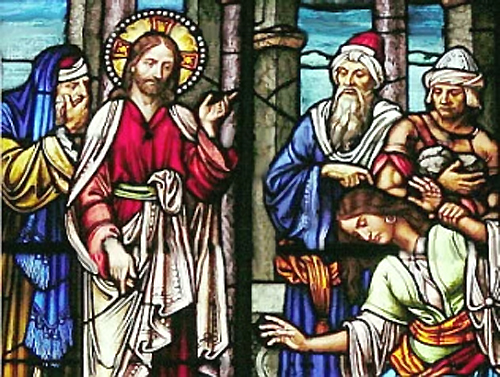Christian Art | Scribes And Pharisees | Jesus And Temple Judaism | King James Audio Bible
Matthew 23: 13-22 – Week 21 Ordinary Time, Monday (King James Audio Bible KJV, Spoken Word)
13 ¶ But woe unto you, scribes and Pharisees, hypocrites! for ye shut up the kingdom of heaven against men: for ye neither go in yourselves, neither suffer ye them that are entering to go in.
14 Woe unto you, scribes and Pharisees, hypocrites! for ye devour widows’ houses, and for a pretence make long prayer: therefore ye shall receive the greater damnation.
15 Woe unto you, scribes and Pharisees, hypocrites! for ye compass sea and land to make one proselyte, and when he is made, ye make him twofold more the child of hell than yourselves.
16 Woe unto you, ye blind guides, which say, Whosoever shall swear by the temple, it is nothing; but whosoever shall swear by the gold of the temple, he is a debtor!
17 Ye fools and blind: for whether is greater, the gold, or the temple that sanctifieth the gold?
18 And, Whosoever shall swear by the altar, it is nothing; but whosoever sweareth by the gift that is upon it, he is guilty.
19 Ye fools and blind: for whether is greater, the gift, or the altar that sanctifieth the gift?
20 Whoso therefore shall swear by the altar, sweareth by it, and by all things thereon.
21 And whoso shall swear by the temple, sweareth by it, and by him that dwelleth therein.
22 And he that shall swear by heaven, sweareth by the throne of God, and by him that sitteth thereon.
Today’s Gospel verses continue Jesus’ stinging critique of the hypocrisy of the Pharisees. Jesus condemns the Pharisees’ conduct, threatening them with punishment – ‘Woe unto you!’ – if they do not repent and mend their ways. Having over the centuries acquired a degree of power in Jerusalem, the Pharisees now abuse that power. Greedy for honour and recognition as they are, their show of great virtue is merely that, a show, while in essence they live in gross discordance with the truth of God.
The Pharisees’ crimes, as Jesus relates them, are grave indeed. Not only do they themselves refuse to enter into the Kingdom of heaven; they prevent others from finding the Kingdom. The Pharisees have shut their doors against Jesus, and they are intent on keeping others from acknowledging Christ. They choke the Word, true not to God but rather enslaved to the evil in their hearts. The Pharisees keep the people from being freed from sin. These are astonishing words of Jesus. We think of the hours each day the Pharisees devoted to prayer, to the effort to perfect themselves, and yet Jesus says they are blind; they have got it all twisted and wrong.
The Pharisees’ crimes extend to devouring widow’s pensions in return for a show of prayer. Additionally, they seek out proselytes, converts to Judaism, and when they have found one convert, who is looking for the light, they constrict him in their own narrow views and false practices. There is the crime of corrupting others.
Finally, in these verses, the Pharisees do not know the true value of those holy things by which oaths are – rightly or wrongly – taken. They say that it is nothing to swear by the altar, but when a person swears by the gift that is upon the altar, that oath is binding. This, Jesus says, is absurd. The Pharisees are blind to the source of such spiritual value the gold that is within the Temple has. They see the gold and cannot see God.
We have come a long way since the Beatitudes of the Sermon on the Mount, from the joy of the promise of a gateway to heaven to this dark opposite, a statement of evils the choke our spiritual capacity, occluding our relationship with God. God is love, yet here we find God’s precepts twisted in evil ways. Jesus strives in these verses to shock us out of our complacency. He speaks to the Pharisees and to the people of Jerusalem, and he speaks to us now.
Concluding Prayer
Father, Creator of all that is good,
you have called men to work in your world,
and by their co-operation to better the condition of mankind.
Grant that we may always work together as children of your family,
and love all men as our brethren.
Through Christ our Lord.

![]()
King James Audio Bible | Endnotes
What Were The Outward Shows Of Holiness Made By The Pharisees?
Jesus condemns the Pharisees for their hypocrisy and their outward shows of holiness. Jesus accuses the Pharisees of neglecting the weightier matters of the law, such as justice, mercy, and faith, while focusing on the smaller details of the law, such as tithing and ritual purity.
The Pharisees were meticulous in their observance of the Sabbath, and would not even lift a finger to help someone in need on that day. They fasted twice a week, and would make a public display of their fasting by disfiguring their faces and wearing sackcloth. They also paid careful attention to the details of the law, such as tithing even the smallest herbs from their gardens.
However, Jesus saw through the Pharisees’ outward shows of holiness and recognized that their hearts were far from God. Jesus accused the Pharisees of being like whitewashed tombs, beautiful on the outside but full of dead bones and uncleanness on the inside. Jesus called the Pharisees hypocrites, saying that they loved to be seen by men, and that they made their phylacteries and fringes long in order to be noticed.
The Pharisees were known for their distinctive appearance, which was designed to make them stand out as holy men. One of the most notable aspects of their appearance was the use of phylacteries, which were small leather boxes containing scripture verses that were worn on the forehead and arm during prayer. This practice was based on the commandment in Deuteronomy 6:8 to ‘bind [God’s words] for a sign upon thine hand, and they shall be as frontlets between thine eyes’. The phylacteries were meant to serve as a physical reminder of God’s presence and commandments, and to help the wearer focus on their prayers.
In addition to the phylacteries, the Pharisees also wore fringes or tassels on the corners of their garments, as commanded in Numbers 15:38-39. These fringes were meant to remind the wearer of the commandments and to help them avoid sin. However, the Pharisees were known for making their fringes longer than necessary in order to draw attention to themselves and demonstrate their piety.
According to the Jewish historian Josephus, the Pharisees were ‘distinguished from the rest of the people by their manner of living, and were considered the most accurate interpreters of the law’ (Antiquities Of The Jews, Book XVII, Chapter II). Top of FormBottom of Form
Through subsequent, Christian history, religious authorities from both the Catholic and Protestant traditions have commented on the issue of outward shows of holiness. Saint Augustine wrote about the danger of focusing too much on external piety at the expense of true faith:
‘What avails it to wear the robe of Christ, unless we live the life of Christ? What avails it to be called Christians, unless we do Christ’s works?…Let us not then deceive ourselves with vain hopes; for, as we have opportunity, let us do good unto all men, especially unto them who are of the household of faith.’ (Expositions on the Book of Psalms, Psalm 33)
In the Protestant tradition, Martin Luther had strong words for those who put too much emphasis on outward shows of holiness:
‘For the righteousness of God is the righteousness of Christ, which he alone works in us, and which, therefore, we can never have of ourselves. He is the vine, and we are the branches; and we can only bear fruit by abiding in him.’ (Commentary On Galatians)
John Wesley, the founder of Methodism, emphasized the importance of faith and works going hand in hand:
‘True faith will work by love; it will purify the heart, overcome the world, and make us holy in all manner of conversation.’ (Sermon On Faith And Good Works)








